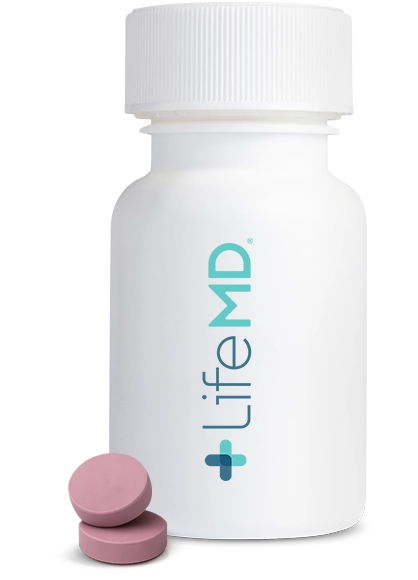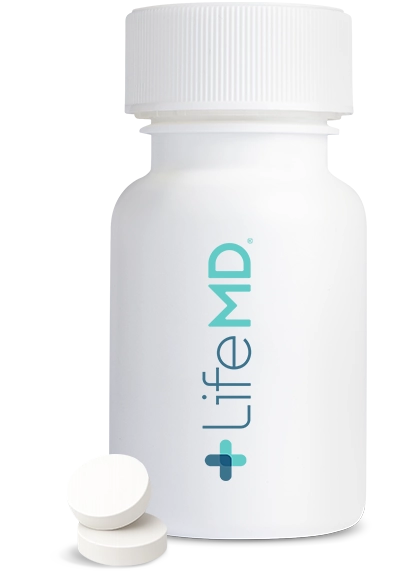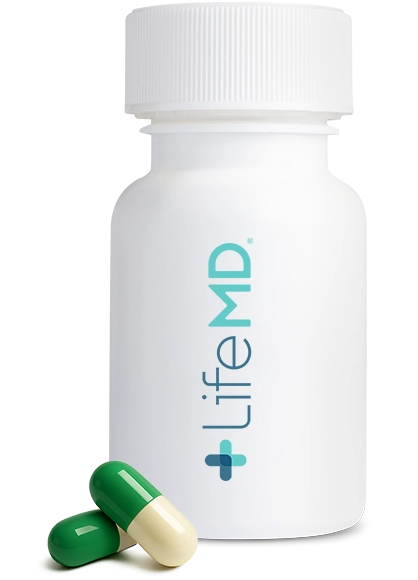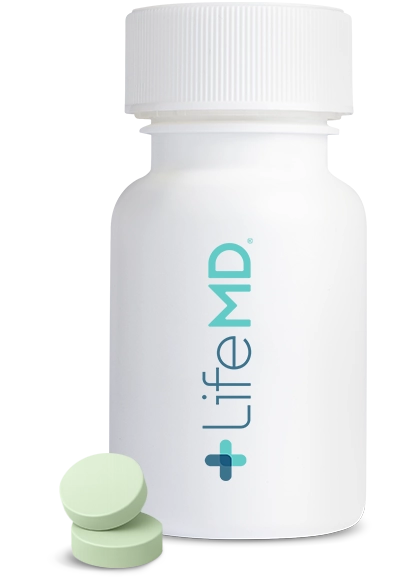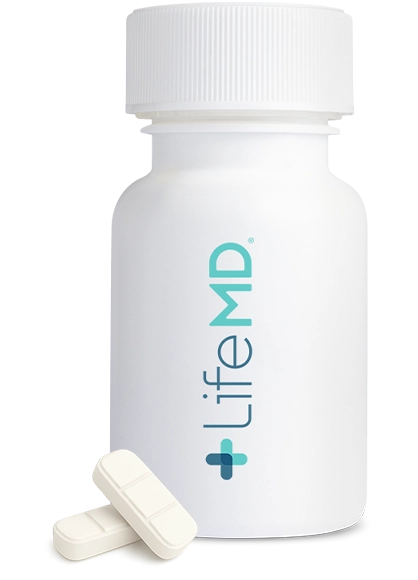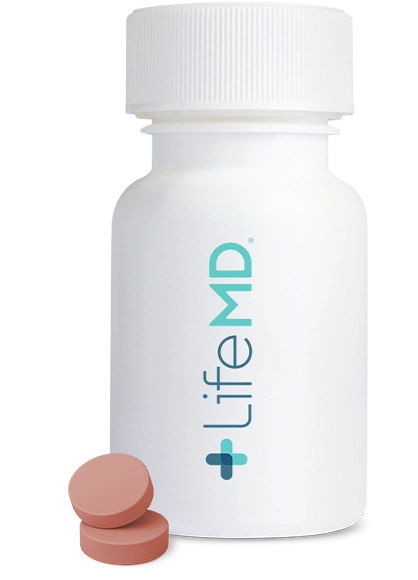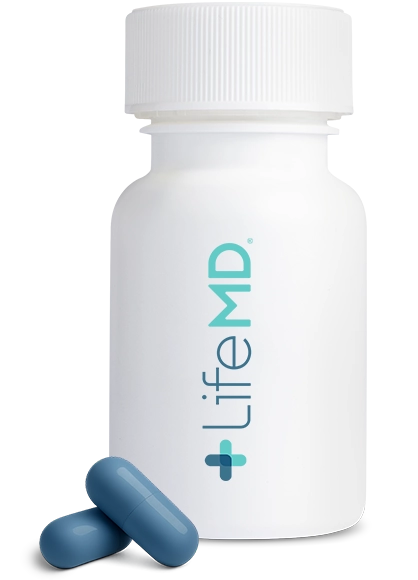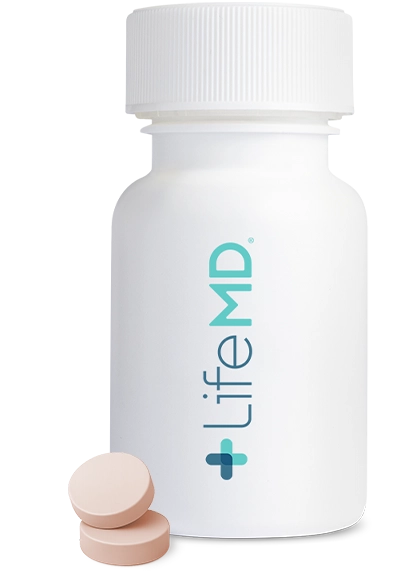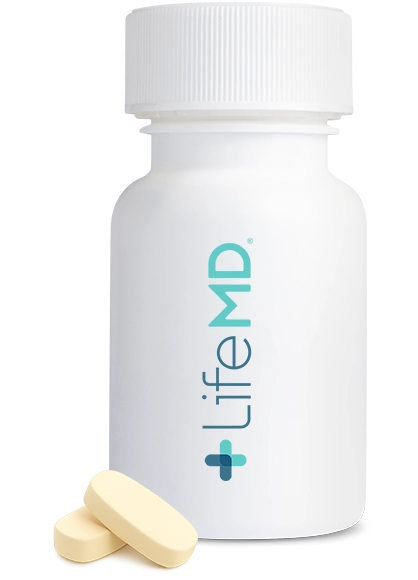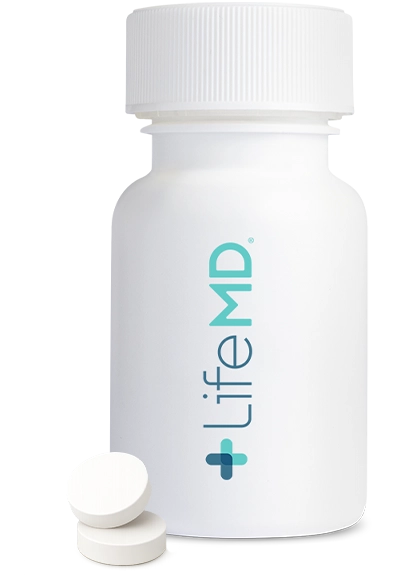Includes medication & delivery
THE FUTURE OF VIRTUAL MENTAL HEALTH SUPPORT
Prescription mental health
support on your time.
Prescription mental
health support on
your time.
Includes prescription medication
mental health treatment, waiting weeks isn’t an option. LifeMD
connects you with a licensed provider for urgent evaluation,
medication, and expert support.
On Apple App Store and Google Play

LifeMD+
5:30pm
Your prescription is filled at the LifeMD
pharmacy and will be shipped today.
LifeMD+
8:45pm
Hi. Following up to see if you’re
feeling better. You got this!
Prescribed Online
Escitalopram
Lexapro®

Access affordable mental
Mental health medication is a core focus of LifeMD’s clinical expertise, and we’ll
work with you to find a prescription that helps you feel and function better.
We believe quality care should be accessible to everyone. The LifeMD Mental
Health Program offers options that are fast, affordable, and easy to start.
Social & Performance Anxiety:
Designed for as-needed treatment. The plan includes an initial review of your health information
and secure messaging with your provider, ongoing message-based support, and a set amount of
medication each month if prescribed.
Anxiety & Depression:
Ideal for managing ongoing anxiety or depression. This plan includes an initial video visit with a
provider, the option for ongoing support through secure messaging, and includes a 30-day
supply of medication if prescribed.
Providers online & available

It’s never been simpler
Fast track your relief.
“If you’re feeling anxious or depressed,
getting prescription medication isn’t as
difficult as you might think.”
Social & Performance Anxiety:
Designed for as-needed treatment. The plan includes
an initial review of your health information and secure
messaging with your provider, ongoing message-
based support, and a set amount of medication each
month if prescribed.
Anxiety & Depression:
Ideal for managing ongoing anxiety or depression. This
plan includes an initial video visit with a provider, the
option for ongoing support through secure messaging,
and includes a 30-day supply of medication if
prescribed.
We’re here to provide the care and support
that are
right for your individual needs.
Virtual mental health care when you need it
Benefits of LifeMD
Providers online & available
How treatment works
Begin treatment online
in just
3 easy steps.
-
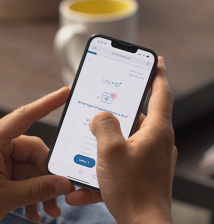
Step-1: Start your consultation
Answer a few questions about your health
history and current symptoms. It
only takes a few minutes. -

Step-2: Connect with a provider
A licensed provider will carefully review
your responses and, if appropriate,
prescribe a personalized treatment plan. -
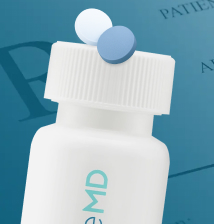
Step-3: Begin a treatment plan
Your provider will create a personalized plan, which may include prescription
medication and ongoing support.If prescribed, your medication will be
delivered to your door. We’ll also check
in to ensure your treatment is working.
Starting treatment is “no big deal” through LifeMD.
Providers online & available

events play a role in how you
are feeling?
You're one step closer to understanding how
you're feeling—and we're here to guide you
toward the care you deserve.
Mild anxiety
What this might feel like
- Feeling anxious or on edge
- Thoughts that won’t stop
- Worrying more than usual
Mild depression
What this might feel like
- Little interest in doing things
- Feeling low or withdrawn
- Sleeping more than usual
We've got a simple solution that may help.
Based on your responses, we recommend starting with Escitalopram, a well-tolerated, daily treatment for mood and anxiety relief.
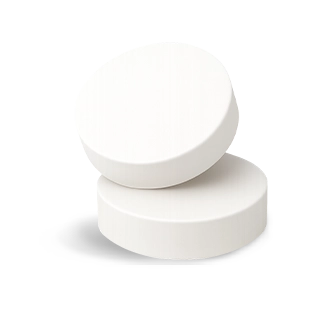
Escitalopram is typically taken once a day and is known to provide steady support for anxiety and depression over time.
What's included:
-
Single-dose pills, renews every month
-
$99 (includes medication and delivery)
Starting treatment is “no big deal” through LifeMD.
Providers online & available
We’re here for your well-being
Personalized treatment
for
mental health
Get comprehensive mental health support when and where you need it.
Whether you’re facing anxiety, depression, or other challenges, LifeMD
offers personalized care to help you feel better on your time.
Get prescription medications
online through LifeMD
Important safety information
Treat a range of mental health conditions, including management of anxiety and depression.
Treatment includes medication, if clinically appropriate by your provider.
- Wellbutrin SR® (Bupropion SR)
- Lexapro® (Escitalopram)
- Prozac® (Fluoxetine)
- Inderal® (Propranolol)
- Buspar® (Buspirone HCI)
- Celexa® (Citalopram)
- Cymbalta® (Duloxetine)
- Effexor® (Venlafaxine)
- Zoloft® (Sertraline)
- Paxil® (Paroxetine)
Treat a range of mental health conditions, including
social anxiety and depression. For many, treatment
may include medication. If clinically appropriate, your
provider can prescribe medication to help manage
social anxiety.
Understanding your treatment
How LifeMD, psychiatric care
and
medication work
together.
Mental health care with medication through LifeMD is
convenient and
affordable—with no outside referrals needed.

LifeMD+
4:30pm
Please feel free to reach out anytime if
you have questions.
Frequently Asked Questions
Get trust-worthy answers through LifeMD

LifeMD+
9:45pm
Please feel free to reach out anytime if
you have questions.
-
What is the LifeMD Mental Health Program?
The LifeMD Mental Health Program provides virtual, medication-based support for anxiety and depression. Care is personalized and accessible from home.
-
What conditions does the program treat?
LifeMD treats performance anxiety, social anxiety, generalized anxiety disorder, and depression through provider-guided medication management.
-
What's included in the LifeMD Mental Health Program?
The program includes provider consultations, personalized treatment, secure messaging, prescription management, and the cost of medication when prescribed.
-
How is my treatment plan personalized?
Every treatment plan is designed based on your symptoms, history, goals, and preferences‚ - no one-size-fits-all approach.
-
What medications may be prescribed?
Depending on your condition and care plan, your provider may prescribe medications like SSRIs, SNRIs, and NDRIs. In addition, where appropriate, medications such as beta blockers may be prescribed "off-label" for certain mental health conditions.
-
Do I need a video visit to receive treatment?
Some patients begin with a video consult, while others may qualify for message-based care depending on their condition and medical history.
-
What happens after I start treatment?
After starting treatment, you'll check in regularly so your provider can review your progress and make adjustments if needed.
-
Who will manage my care at LifeMD?
You'll work with a licensed medical provider who will design and adjust your treatment plan based on your symptoms and goals.
-
How often will my plan be reviewed?
Treatment plans are reviewed monthly through brief renewal check-ins to monitor symptoms, side effects, and treatment effectiveness.
-
Will I be able to message my provider?
Yes. You'll have secure messaging access to your provider so you can ask questions or share updates at any time.
-
What if I have questions between appointments?
You can securely message your provider anytime through the patient portal with questions or concerns.
-
How do refills work?
Your provider will send refill reminders and request check-ins to assess your response before renewing medications each month.
-
Will my dosage change over time?
It depends. Your provider may adjust your dosage based on monthly check-ins and symptom tracking.
-
Is everything handled online?
Yes. All care, from consultations to prescription delivery, is handled online for convenience, privacy, and flexibility.
Connect with licensed experts - anytime, anywhere
Clinically proven psychiatry treatments
LifeMD offers comprehensive, personalized care through psychiatry services and medication.
Our secure virtual platform makes accessing quality mental health care “no big deal”.
Important Notice: Talk to your psychiatrist or healthcare professional about the possible risks and benefits associated with the above medications
before starting treatment. LifeMD does not offer therapy or counseling services and is not equipped to respond to mental health emergencies. If you’re
experiencing a crisis, please call 911 or visit the nearest emergency room. IF YOU ARE CONTEMPLATING SUICIDE, CONTACT 911 OR CALL/TEXT THE
NATIONAL SUICIDE PREVENTION LINE AT 988. These services are available 24/7.








